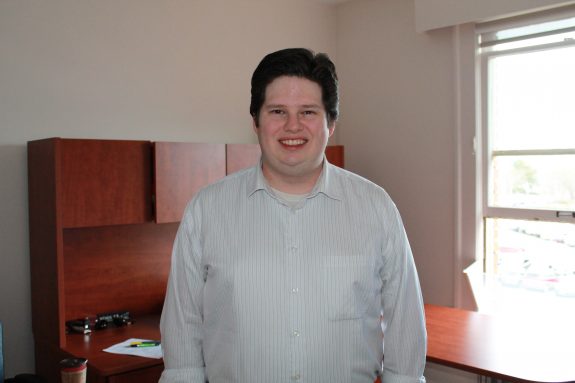Contributed by Rory Allen, Island Health.
What do you do here at Island Health?
I’m part of the planning department. We provide both medium and long term planning for the organization, and we work with the Ministry of Health a lot on making sure that Island Health’s accountability plans and reports are aligned with Ministry direction, up to date, and show what we’re doing and where we’re going as an organization. And my role specifically and the other folks in the Strategic Program Planning side of things, we work on special projects that come up- things like business cases for new hospitals, if there’s a new type of program or something like that, something that needs extra planning support- putting together documents, gathering data. So we just lend a hand wherever we can on stuff like that.
How did you hear about Change Day?
Helga Avila has been a pretty big champion of that around here! She spread that around in all the different planning portfolios. And Karen Clifford, our admin assistant, was a real champion for making sure everyone got their pledge in.
And you made a pledge?
Yes! My specific pledge was to learn the layout of the Royal Jubilee Hospital better so that I could help direct people when they stop and ask me for directions. The reason I picked that pledge was that I often find, while walking through the hospital with my name badge that identifies me as a staff member, I do get stopped by people a lot, asking how to get to the lab, or the medical imaging department. And honestly, sometimes even for me it’s confusing finding where to go in a hospital! And I’m here every day! And certainly if you’re late for an appointment or you’re having a medical issue, it can be difficult to find where you need to go. I just wanted to know where to find things better, so I can help people get there faster and give them more accurate directions. Honestly, in the past I’ve sent people in the wrong direction, and that was quite embarrassing. So I thought, that’s one of my direct interactions with patients and clients in the hospital, and I thought it was a positive thing: that someone could walk into a hospital and it doesn’t matter who they talk to, someone will be there to help them in some way.
Have you had any good interactions since then?
I don’t know if I’ve given any really challenging directions! But I haven’t made any mistakes yet. I sort of test myself- I’ll give directions, and then when I get back to my desk I quickly look up the right answer and make sure I gave it. People are always so grateful, I guess, that they can stop and you can point them in the right direction. It’s really nice- it’s one of those bright spots in the day when you run into someone and you can just help them a little bit.
How did you learn the hospital better?
On my way to Tim Hortons or wherever, I would always stop at the maps on the hallways and check them out. And on our intranet as well, we’ve got maps in there, so I would examine them and try to think about the more common places that people need to go, and just test myself a bit here and there. In retrospect what I think I need to do is just carry a little map with me as a reference- but then that would be cheating, because I wouldn’t actually be learning the hospital, I’d be referring to a map!
Did any of your colleagues ask you about your pledge?
They actually did! We brought it up at a team meeting one time- because Helga and Karen were such good champions, making sure we all got one in there. We all as a team shared our pledges and it was interesting to hear- some were more personal, like “I’d like to ride my bike to work more,” and some were more professional. So interesting to see the wide range, like when you visit the Gallery of Pledges and see the diversity of those. I think people liked mine because it was an easy little one. I didn’t commit to transforming my entire life, but I just made one little change.
And you’re still doing it!
I am, yeah! It’s still helpful, I suppose. Hopefully it sticks in my memory.
Does it make you feel good when you give someone directions?
It does, because I’m a little bit removed from patient interactions, so it’s one of those things where there is the opportunity to actually help someone directly like that, it feels pretty good. It’s nice. It’s such a small thing compared to all the help and care that others provide in our organization, but I think we can all do a little part, and that’s my little part right there.


